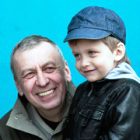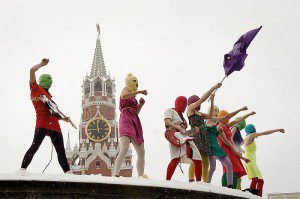15 May 2012 | Azerbaijan News, Europe and Central Asia, Index Index, minipost
Index on Censorship writer and youth activist Turgut Gambar was among activists arrested yesterday (14 May) during a demonstration in Baku, Azerbaian. Police violently dispersed peaceful protests ahead of the Eurovision Song Contest which will take place later this month. Specifically targeting opposition party members, police beat demonstrators at rallies in Sabir Garden in front of the city authorities’ offices. Around 300 protesters gathered to call for the release of Azerbaijan’s political prisoners.
20 Apr 2012 | Europe and Central Asia, News
 The release of Andrei Sannikov and Dzmitry Bandarenka last weekend was welcome news for Europe’s last dictatorship. But with at least 13 more political prisoners behind bars, Belarus is far from free
The release of Andrei Sannikov and Dzmitry Bandarenka last weekend was welcome news for Europe’s last dictatorship. But with at least 13 more political prisoners behind bars, Belarus is far from free
(more…)
15 Mar 2012 | News
 In a “repressive” decision, Moscow city court refuse to release two members of punk feminist group Pussy Riot. Elena Vlasenko reports
In a “repressive” decision, Moscow city court refuse to release two members of punk feminist group Pussy Riot. Elena Vlasenko reports
(more…)
15 Mar 2012 | Russia
Moscow city court has refused to release two members of punk feminist group Pussy Riot. Nadezhda Tolokonnikova and Maria Alekhina were arrested after having performed a protest song “Mother of God, send Putin away” in Moscow’s Christ the Saviour cathedral on charge of hooliganism. Now they will be staying under arrest until 24 April, when they face trial and might be sentenced to up to seven years in prison.
The case is seen as politically motivated as Russia’s prime minister Vladimir Putin, who has just won the presidential elections, was likely to take offence at the protest, according to Tolokonnikova’s husband and Moscow art activist Petr Verzilov. That might be the reason why the court did not take into consideration that both Tolokonnikova and Alekhina have young children.
Lawyers for members of Pussy Riot have expressed concern that the judge who sanctioned their arrest is also offended and biased: in July 2010 she tried a case against organisers of the “Forbidden Art” exhibition. They were found guilty of “debasing religious beliefs of citizens and inciting religious hatred”. Tolokonnikova together with other Voina activists protested against the verdict by bringing cockroaches to the court room and letting them free there.
Russia’s leading human rights activists Lyudmila Alekseeva and Lev Ponomaryov have condemned Tolokonnikova’s and Alekhina’s arrest, calling the court decision “repressive” and highlighting selectivity of Russian judicial system.
While Pussy Riot remains under arrest awaiting trial, a policeman in the city of Kazan who is suspected of violence against a detainee which led to his death was released before the trial. The policeman together with his colleagues in Kazan’s Dalni police department allegedly raped the detainee with a champagne bottle.
A number of single pickets supporting Tolokonnikova’s and Alekhina’s have taken place near the court building. Three protesters were arrested for breaking the rules on pickets after instigators, allegedly from pro-Kremlin youth movements, tried to attack them, take away their placards and initiate a scuffle. Activists in Novosibirsk have created “icons” depicting Pussy Riot members. The church has already called it hooliganism and asked for an investigation.
Meanwhile another political prisoner, Taisiya Osipova — a member of The Other Russia opposition movement, and also a mother of a small child — has been refused freedom until her trial in Smolensk. She was sentenced to ten years on charges of drug trafficking in December. After mass protests against her prosecution, with even President Medvedev saying the verdict was “too cruel”, the court cancelled the verdict and submitted the case for reconsideration. Osipova, who has diabetes and claims the case was trumped-up as a revenge for her and her husband’s membership in The Other Russia, was to be released on 13 March. Now she will stay under arrest until 15 June. Her supporters also worry that the biased court will find her guilty again.
Both Osipova and Pussy Riot’s cases were subjects of mass protest rallies in Moscow. All the rallies’ resolutions included the demand to release political prisoners immediately. Just as the other requirements, this one was not fulfilled by Russian authorities.
If anyone doubted that protest mood remained strong in Russia, politically motivated cases might be the reason not to have any more doubts.

 The release of Andrei Sannikov and Dzmitry Bandarenka last weekend was welcome news for Europe’s last dictatorship. But with at least 13 more political prisoners behind bars, Belarus is far from free
The release of Andrei Sannikov and Dzmitry Bandarenka last weekend was welcome news for Europe’s last dictatorship. But with at least 13 more political prisoners behind bars, Belarus is far from free